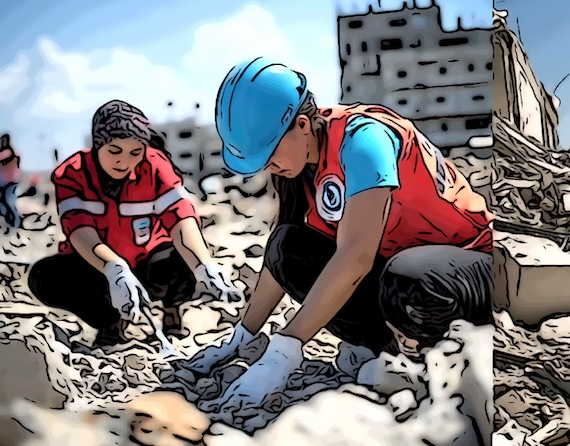( Foreign Policy in Focus ) – The recent Israeli measures against the UN Relief and Works Agency (UNRWA)—including two controversial bills to ban UNRWA from operating on Israeli territory and areas under Israel’s control—are certainly a distressing development. In the early years of Israel’s statehood, after its 1948 establishment, Israel’s UN membership was held up for two years due to unresolved questions around the status of displaced Palestinians. The United Nations was still quite young when it passed Resolution 194, which recognized the rights of Palestinian refugees to return home and receive compensation for their losses—a commitment that has influenced rounds of talks over the decades.
Since then, this resolution has been a pivotal point in discussions between Palestinians and Israelis. Palestinians have continued to demand that Israel acknowledge its role in this forced displacement and provide compensation, seeing it not only as a matter of historical fact but as an overdue moral obligation. Today, Israel’s treatment of UNRWA reflects the chronic tension between its own state objectives and a humanitarian question the UN has never abandoned. Israel’s recent actions raise pricking questions about its commitment to that international consensus and the lingering need for accountability in this conflict.
The United States, in order to address the dire conditions faced by Palestinian refugees along Israel’s borders, played a major role in establishing UNRWA in 1950. This agency, originally backed by substantial American funding, became a critical lifeline for Palestinian refugees across the West Bank, Gaza, Jordan, Syria, and Lebanon, continuously serving a population that is now almost six million. Since its inception, UNRWA has remained a purely humanitarian outfit in every sense, focused solely on delivering essential services such as education, food, medical care, and fuel to a community facing immense hardship.

However, this lifeline faced a serious setback during the Trump administration, which squeezed U.S. contributions. Biden, due to mounting pressure from pro-Israel factions in Congress, partly upheld this a stance . The funding gap has emboldened Israel’s right-wing extremist leaders to diminish the significance of the Palestinian refugee crisis in global discourse. Obviously, without UNRWA, Palestinians risk losing their most vital support system, which provides stability in an otherwise precarious situation.
Although UNRWA operates strictly within its UN mandate, its mere presence has become a focal point in the ongoing Israeli-Palestinian conflict. Over the years, Israel’s supporters have worked to erode the agency’s reputation, urging major contributors to withhold funding or, in some cases, presenting dubious claims about UNRWA’s operations. The accusation that UNRWA staff were somehow complicit in Hamas’ attacks on October 7 was promptly investigated by a special UN committee. The findings were unequivocal: no evidence linked UNRWA staff to any wrongdoing. The inquiry exposed and rebutted Israel’s baseless allegations.
The UN inquiry divulged that Israel hadn’t provided names or credible information to substantiate these allegations. In fact, UNRWA had been requesting such details from Israel since 2011, with no response. This episode has exposed the continued challenges faced by UNRWA in executing its mandate amidst politicized pressure from Israel.
In a stunning turn of events on October 28, Israel’s Knesset overwhelmingly voted to ban the UNRWA from operating within Israel, with 92 out of 120 members supporting the move. In a second measure, 87 Knesset members also approved a ban on Israeli state authorities interacting with UNRWA, effectively hobbling its capacity to operate in the Occupied Territories. This week, foreign ministers from Canada, Australia, France, Germany, Japan, South Korea, and the UK warned of the “devastating consequences” this ban could unleash across the West Bank and Gaza.
Shortly before this, in another blatant display of brutal aggression, Israeli authorities seized the land in East Jerusalem housing UNRWA’s headquarters, reportedly to construct 1,440 new settlement units. This move contravenes international law.
The timing and audacity of these actions have left the international community grappling with a troubling reality. Israel’s plans to dismantle the very mechanisms designed to support and assist vulnerable Palestinians will not only aggravate the humanitarian crisis but also deepen the operational problems for the agency. In choosing to silence the very agency tasked with aiding displaced Palestinians, Israel is seriously damaging its own legitimacy on the global stage. In so doing, Israel is actually strengthening the case of those who question that very legitimacy. Ironically, in attempting to erase the presence of Palestinian refugees from its landscape, Israel’s actions could very well enhance the visibility of that issue.
Imran Khalid is a geostrategic analyst and columnist on international affairs. His work has been widely published by prestigious international news organizations and publications.


 © 2025 All Rights Reserved
© 2025 All Rights Reserved